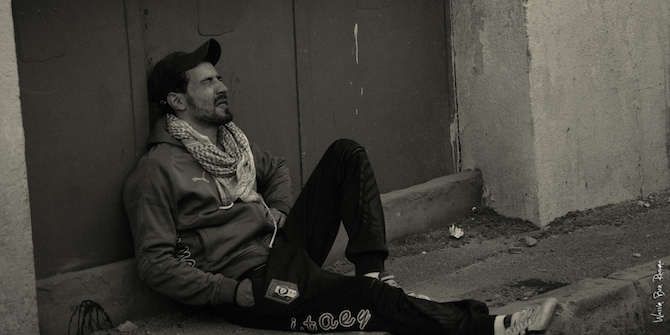by Francesco Milan
This article is part of a 7-part series assessing the prospects and challenges for the study of North Africa in the wake of the Arab Spring.

A protester suffers the effect of tear gas from the Tunisian police, 14 January 2011. © Wassim Ben Rhouma / Flickr (https://flic.kr/p/9d5neg)
Speaking at a recent LSE event, Shaikh Rached Ghannouchi stressed how, throughout the Arab world, democracy is set to become the only game in town: ‘it is only a matter of time’, Ennahda’s founder and leader remarked. In the context of Tunisia, however, Ghannouchi also pointed out how ‘democracy will decline if young people cannot find jobs or bread to eat.’
Since the beginning of Tunisia’s transition, various scholars and policy experts have focused on the question of whether the democratic achievements obtained after 2011 might eventually be lost, chiefly due to the political elite’s inability to channel popular demands into long-term structural policy reforms. Throughout the post-Ben Ali era, structural issues such as core/periphery inequality, youth unemployment and lack of civic engagement have not been addressed, and these – which originated as political and socioeconomic issues – have festered long enough to now include a security component.
The absence of a political vision for Tunisia’s struggling interior governorates, which stand in stark contrast to the relatively well-off coastal areas, has been a source of constant turmoil and friction between those who live in those areas and the political elites in Tunis. Across the country, in fact, the lack of responsiveness to social instances that governments and ‘older generations’ have demonstrated has inspired the youth to take matters into their own hands. This has led to a whole spectrum of initiatives: both peaceful, as seen in the rise in the number of collectives, associations and non-violent movements that finally managed to carve themselves a role in Tunisia’s civil society; and otherwise, as it has also been one of the chief drivers of radicalisation among Tunisian youth.
As opportunities for political, professional, or civic engagement are virtually non-existent, local organisations with a more effective grassroots-level network, that proactively challenge the status-quo on a broad spectrum of issues, have been able to expand their outreach. Salafi jihadist organisations stand as a key example of such an approach: with the fall of Ben Ali’s regime, ‘the novelty of the political arrangements was beneficial to jihadi Salafism initially, as the new liberal environment allowed it to proselytise and organise in the open while railing against democracy and liberalism.’
Together with other jihadist entities, Daesh has grown to play an influent role across Tunisia, especially after expanding its presence in neighbouring Libya. Tunisia has also become the country producing the highest number (both per capita and in absolute terms) of foreign fighters joining the ranks of Daesh. For many of the 6,000–7,000 Tunisian fighters, the process of radicalisation began under Ben Ali’s ultrasecular repression; but many others were radicalised after witnessing what they considered a failed revolution.
Effectively, the so-called ‘battle of Ben Guerdane’ of March 2016 stood as a potential turning point for the survival of Tunisia as we know it today. As Daesh and Ansar al Sharia militants attempted to establish a stronghold in the east of the country, Tunisia’s security forces eventually managed to gain the upper hand: in two days of clashes, 7 civilians, 36 militants, and 12 member of the security forces were killed.
The attack took place while Tunisia was already under a formal state of emergency, declared in November 2015, after the third major terrorist attack carried out by Daesh on Tunisian soil in the span of nine months killed 12 presidential guards transiting through one of Tunis’ main roads. Since then, every three months President Beji Caid Essebsi has consulted with the prime minister and the speaker of the Parliament before eventually deciding to renew the state of emergency – most recently in November 2017. Prime Minister Youssef Chahed’s reassurances in February 2017 that there would not be any additional extension of the state of emergency (it was due to be lifted in mid-May) appear to have been over-optimistic.
Growing uneasiness with the state of emergency shows the extent to which the legacy of Ben Ali’s regime lingers on: throughout his time in power, Ben Ali systematically relied on ‘harassment, repression, and co-optation’ to maintain control. Pivotal in this effort was the work of the Tunisian police, together with other internal security services, and the broader Ministry of Interior. Today, various non-governmental organisations and representatives of civil society reject that the police’s doctrine, practices, and mentality dating from the regime era can be written off as a thing of the past, with the constant state of emergency only serving to compound the problem.
As recent protests and clashes with the police have shown, the ‘jobs and bread’ solution Sheikh Ghannouchi hinted at does not seem to be within immediate reach – especially if encounters with the police are only interaction with the state that much of Tunisia’s youth is exposed to, or the occasional ‘helicopter visit’ by a member of the political elite offering trite promises to create new jobs. In any case, while the hallmarks of the old regime linger on, the spirit of the revolution remains alive and kicking.
 Francesco Milan teaches at the Defence Studies Department, King’s College London, and at the UK Joint Services Command and Staff College. He previously worked as Research Assistant at the International Institute for Strategic Studies (IISS), and as Teaching Assistant at the Department of War Studies, King’s College London. He also works as freelance analyst and consultant – his publications are available at www.ffmilan.net. He tweets at @Milan_FF
Francesco Milan teaches at the Defence Studies Department, King’s College London, and at the UK Joint Services Command and Staff College. He previously worked as Research Assistant at the International Institute for Strategic Studies (IISS), and as Teaching Assistant at the Department of War Studies, King’s College London. He also works as freelance analyst and consultant – his publications are available at www.ffmilan.net. He tweets at @Milan_FF
In this series:
- The Arab Spring and the Academy: Studying North Africa in the Wake of the Protest by Jonathan Hill
- An Uprising in the Social Sciences? The Study of Middle East Politics in Transformation by Florian Kohstall
- Studying Libya today: Exploring the past to understand the present and shape future research agendas by Anna Baldinetti
- Algeria: Changing behind a Façade of Stalemate by Rasmus Alenius Boserup
- Revisiting the Cultural Field in Morocco and Tunisia after the ‘Arab Spring’ by Cristina Moreno Almeida
- Refugees and ‘Host Communities’ Facing Gender-Based Violence around Mbera Camp, Mauritania by Olga Martín González





